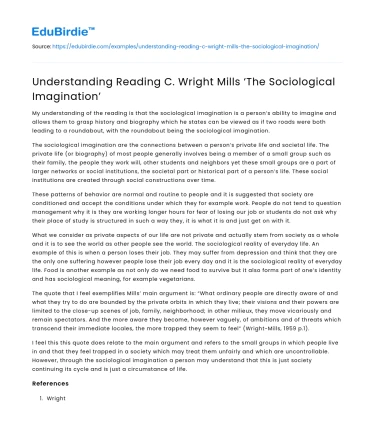My understanding of the reading is that the sociological imagination is a person’s ability to imagine and allows them to grasp history and biography which he states can be viewed as if two roads were both leading to a roundabout, with the roundabout being the sociological imagination.
The sociological imagination are the connections between a person’s private life and societal life. The private life (or biography) of most people generally involves being a member of a small group such as their family, the people they work will, other students and neighbors yet these small groups are a part of larger networks or social institutions, the societal part or historical part of a person’s life. These social institutions are created through social constructions over time.
Save your time!
We can take care of your essay
- Proper editing and formatting
- Free revision, title page, and bibliography
- Flexible prices and money-back guarantee
These patterns of behavior are normal and routine to people and it is suggested that society are conditioned and accept the conditions under which they for example work. People do not tend to question management why it is they are working longer hours for fear of losing our job or students do not ask why their place of study is structured in such a way they, it is what it is and just get on with it.
What we consider as private aspects of our life are not private and actually stem from society as a whole and it is to see the world as other people see the world. The sociological reality of everyday life. An example of this is when a person loses their job. They may suffer from depression and think that they are the only one suffering however people lose their job every day and it is the sociological reality of everyday life. Food is another example as not only do we need food to survive but it also forms part of one’s identity and has sociological meaning, for example vegetarians.
The quote that I feel exemplifies Mills’ main argument is: “What ordinary people are directly aware of and what they try to do are bounded by the private orbits in which they live; their visions and their powers are limited to the close-up scenes of job, family, neighborhood; in other milieux, they move vicariously and remain spectators. And the more aware they become, however vaguely, of ambitions and of threats which transcend their immediate locales, the more trapped they seem to feel” (Wright-Mills, 1959 p.1).
I feel this this quote does relate to the main argument and refers to the small groups in which people live in and that they feel trapped in a society which may treat them unfairly and which are uncontrollable. However, through the sociological imagination a person may understand that this is just society continuing its cycle and is just a circumstance of life.
References
- Wright-Mills, C. (1959) Sociological Imagination, UK: Oxford University Press.






 Stuck on your essay?
Stuck on your essay?

